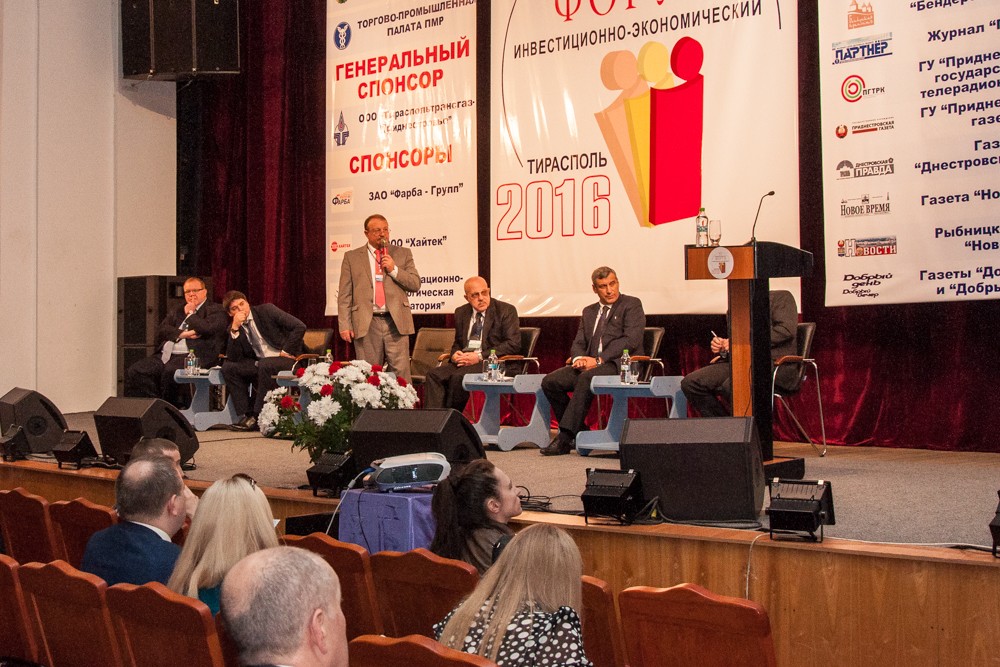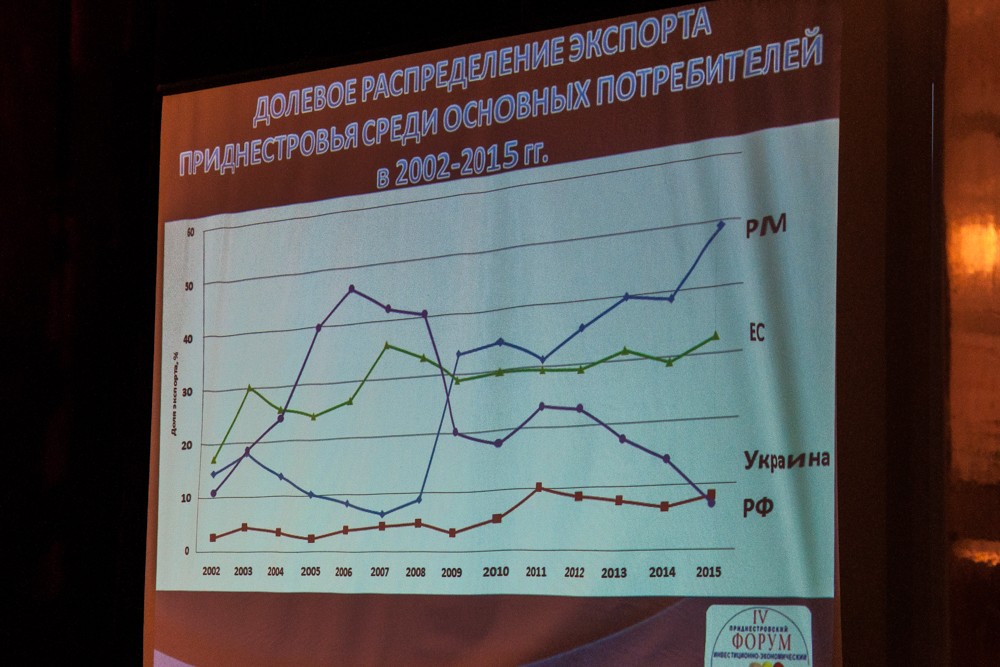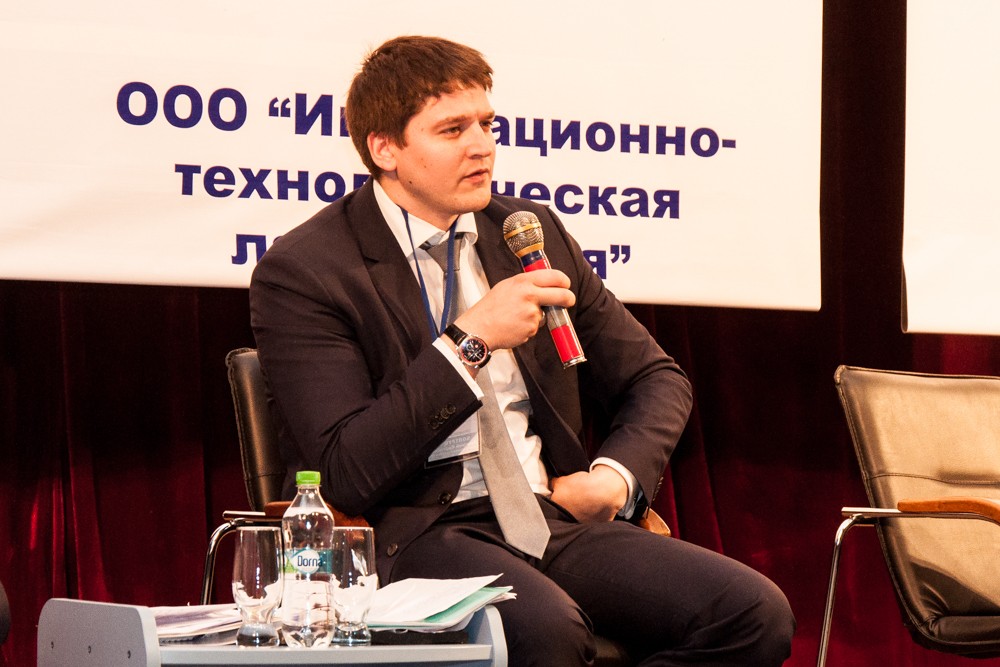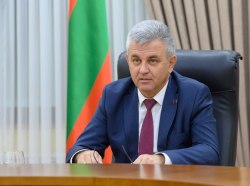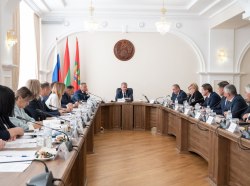Tiraspol, 19 May. /Novosti Pridnestrovya/. Prospects for the expansion of foreign markets were discussed at one of discussion platforms at the investment economic forum, which started today. Experts noted that in the past years the structure of Pridnestrovian export has slightly changed: we are selling more goods to Moldova and the EU, appreciably fewer to Russia and almost as many to Ukraine.
Based on last year's results, our main partners are still Moldova (49% of total volume of exports) and Romania (15%). And only 8% accounts for both Russia and Ukraine.
According to the president of Pridnestrovie's Chamber of Commerce and Industry (CCI), Yury Ganin, each market outlet has its own problems preventing Pridnestrovian exports from being increased. Thus, we do not have mutual regulations for trading with Moldova, which makes this process chaotic. Besides, there are issues related to tariff and non-tariff barriers. Some Ukrainian banks have recently started to stall bank transactions upon purchase or sale of Pridnestrovian goods.
«It is not clear how we'll trade with the EU after 2017, when the current special trade regime will expire. But the most problematic issue is that the EU insists on our exempting duties from their goods, and compensation for the ensuing budget shortfalls remains an acute issue," said Yury Ganin.
According to the CCI president, the Russian market remains the most desirable for Pridnestrovie, on the one hand, and the most problematic, on the other.
«We seriously disagree about devaluation rates and the general approach to this issue. Besides, after Moldova had signed a DCFTA agreement, we fell under Russian trade restrictions, and the whole range of goods was taken out form the free trade regime. Besides, we are seeking our place in Russia's import substitution programme," he noted.
The minister of economic development, Dmitry Boltrushko, added that the country's foreign economic activities are weakly diversified: 37% of exports account for electric power and 20% for metal products. He also noted that restrictions constantly imposed by Moldova and Ukraine also hinder the development of foreign trade.
«For instance, Moldova levied fees on us, and only great efforts undertaken by political representatives in 2014 managed to stop this practice. These included ecology fees, customs clearance duties, and, moreover, VAT was applied when importing Pridnestrovian goods through Moldova. This measure was also abolished with great difficulty," said Dmitry Boltrushko.
He also pointed out that Pridnestrovian manufacturers lack their own resources to come into foreign markets.
«And we are going to work in this field to consolidate these enterprises and by joint efforts entry into various markets. As regards the Russian market, we are seeking to open a trading house and allocate trading platforms to Pridnestrovian enterprises," said the minister of economic development.
The foreign affairs adviser to the president of Russia's CCI, Georgy Petrov, underscored that a solution to many Pridnestrovian economic issues is outside the country.
According to him, round table talks and various discussion platforms could enhance cooperation between Pridnestrovian and Russian economic agents.
«Cooperation between our chambers of commerce and industry aims at building an infrastructure for business communications, finding business partners, prompting solutions," he said.
The representative of Belgium's GFA Consulting Group, Philip Santens, said that many issues relating to trade relations with Pridnestrovie (at least, in the EU) are very politicised. He advised to concentrate on the most promising groups of goods which will be exported to the EU and remember the main components of success.
«The most important thing is the price. No one is going to even talk to you if the price for your goods is not at least 10% lower than in the EU. The second rule is the quality, which must be permanently high, and not just at first shipment," he said.
Pridnestrovian exporters, in turn, voiced the problems hindering their work. Thus, the director of the Floare plant, Boris Kichuk, noted that the maintenance of the Pridnestrovian rouble's exchange rate was a mistake. This has led to a sharp rise in prices for the plant's goods in foreign markets and loss of competition ability.
Other exporters are experiencing similar problems. So, the director general of the Elektromash plant, Valdimir Trandasir, mentioned among major difficulties the Russian rouble's devaluation and, as a result, a sharp rise in prices for the plant's products in the Russian market, inclusion into the Russian import substitution problem and extension of payment terms by customers.
He believes that the Pridnestrovian exporters who want to sell goods to Russia (they suffered most of all during the crisis, and they can't re-orient towards other market outlets) require a special state support programme in Pridnestrovie.
«In addition, we need to facilitate as much as possible the access of our enterprises to the Russian market. Be it business dialogues or any other measures, but these measures must be common, they must be announced so that we have a clear understanding of the preferences Russia is ready today to grant to Pridnestrovian manufacturers, exporting enterprises," he said.

